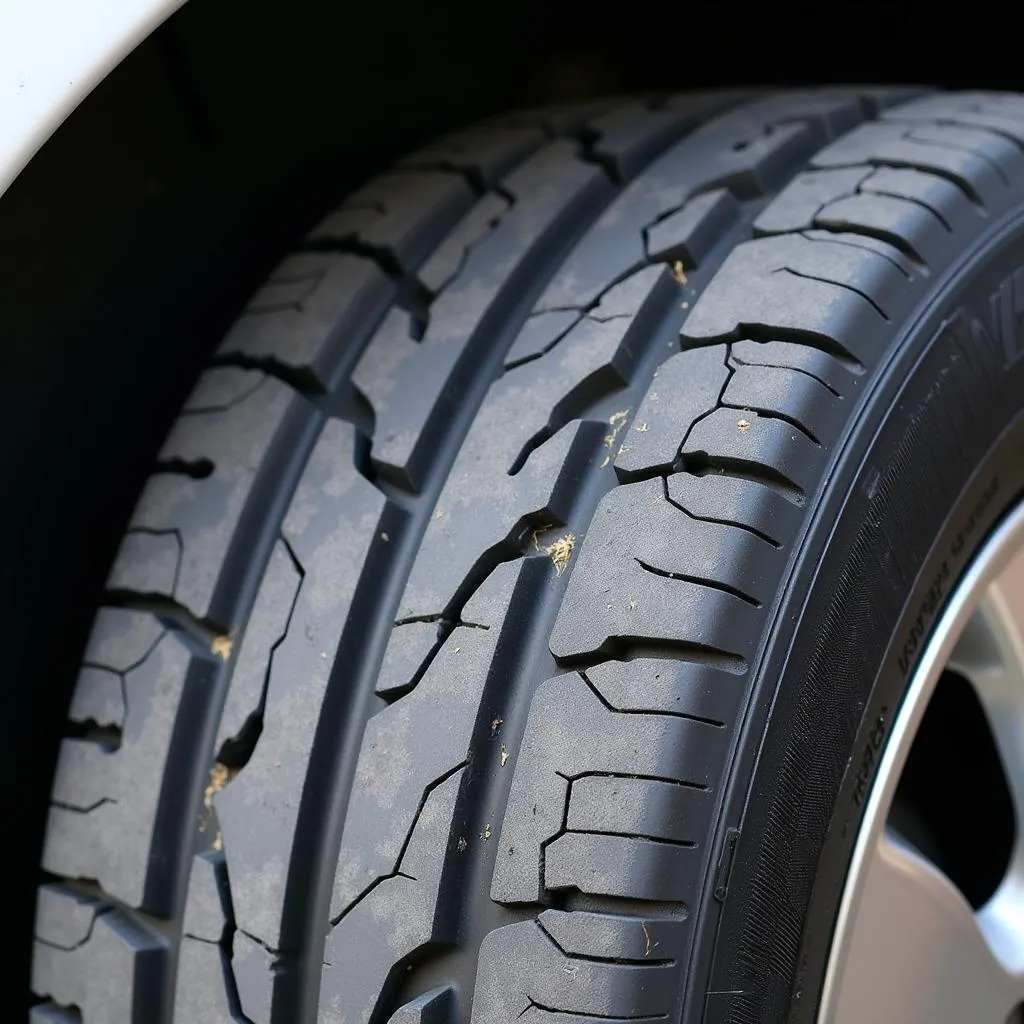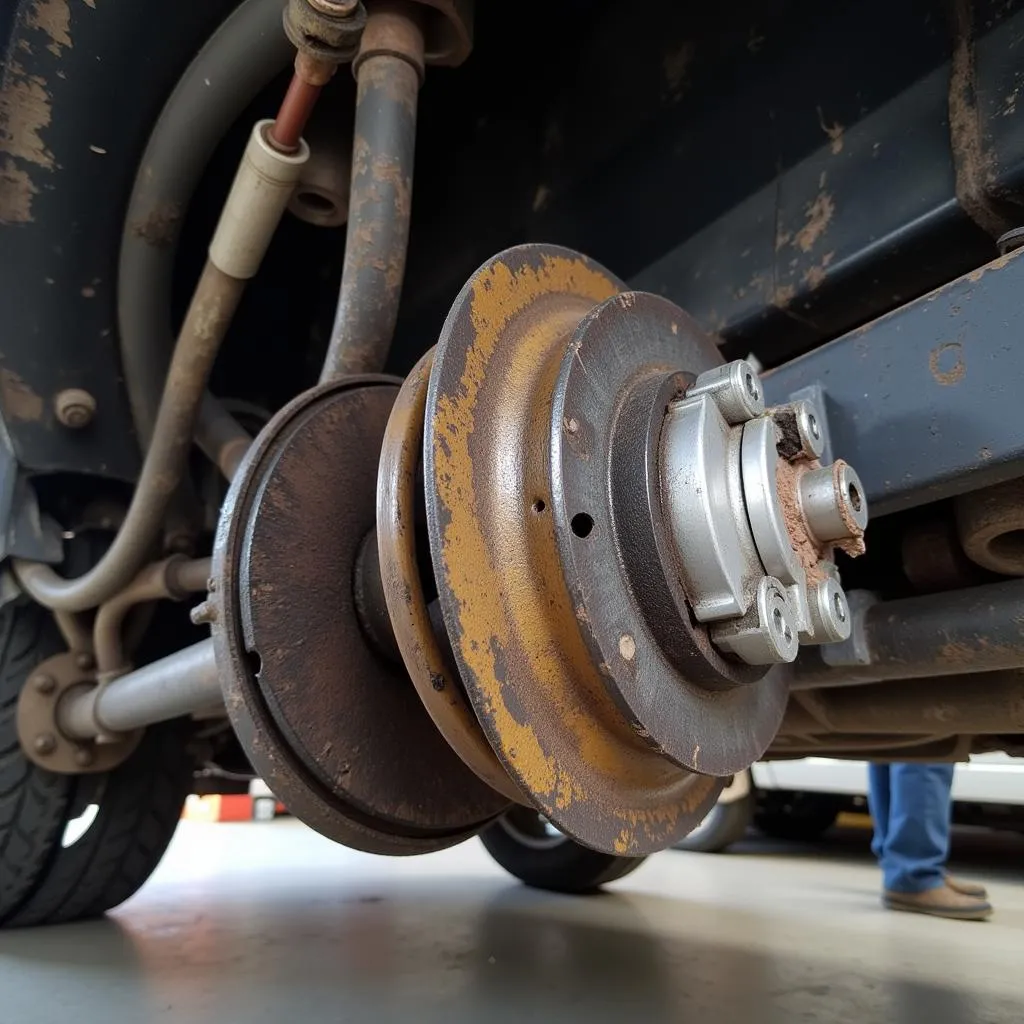Vibrations in your vehicle can be unsettling, often signaling underlying mechanical issues. While a gentle hum is normal, excessive shaking can point towards a range of problems, from minor tire imbalances to serious engine malfunctions. Understanding the common causes of car vibrations can help you address these issues promptly and ensure a smooth and safe ride.
 Worn-Out Tires
Worn-Out Tires
Common Culprits Behind the Shakes
1. Tire Troubles: The Usual Suspects
Tires are often the primary culprits behind car vibrations. Uneven wear, improper inflation, or internal damage can all throw your wheels off balance, leading to noticeable vibrations, especially at higher speeds.
- Tire Imbalance: This occurs when the weight distribution within the tire is uneven. Imagine a washing machine wobbling during its spin cycle due to an uneven load – a similar principle applies to unbalanced tires.
- Wheel Alignment Issues: Misaligned wheels can cause your car to pull to one side and create vibrations. Think of it like walking with one foot slightly turned out – it affects your balance and creates an uneven gait.
- Worn-Out Tires: As tires wear down, their tread becomes uneven, reducing their contact with the road surface and increasing the likelihood of vibrations.
These tire-related issues not only impact your driving comfort but also compromise safety and fuel efficiency. Regularly inspecting your tires for wear and tear, maintaining proper inflation, and getting your wheels balanced and aligned can prevent these vibrations and ensure a smoother ride.
2. Engine Issues: The Heart of the Matter
A malfunctioning engine can manifest in various ways, including vibrations.
- Worn-Out Engine Mounts: Engine mounts act as shock absorbers, minimizing engine vibrations felt throughout the vehicle. When these mounts wear out, the engine’s vibrations become more pronounced, especially during acceleration or deceleration.
- Spark Plug Problems: Faulty spark plugs can disrupt the combustion process, leading to engine misfires that cause noticeable vibrations.
- Fuel System Issues: Problems with fuel delivery, such as a clogged fuel filter or malfunctioning fuel injectors, can also lead to engine vibrations.
Engine-related vibrations often feel more pronounced through the steering wheel, floorboard, or even the seats. Addressing these issues promptly is crucial as ignoring them can lead to more severe engine damage and costly repairs.
 Damaged CV Axle
Damaged CV Axle
3. Drivetrain Dilemmas: From Axles to Driveshafts
The drivetrain, responsible for transferring power from the engine to the wheels, can also be a source of vibrations.
- Worn-Out CV Axles: CV axles transfer power to the wheels, allowing for steering. Damaged CV joints can cause vibrations, particularly during acceleration or turning.
- Damaged Driveshaft: The driveshaft connects the transmission to the rear differential in rear-wheel drive and four-wheel drive vehicles. A bent or damaged driveshaft can create vibrations that worsen with speed.
Ignoring drivetrain issues can lead to significant safety hazards, potentially causing a loss of control while driving.
Diagnosing the Vibrations: A Systematic Approach
Identifying the root cause of vibrations requires a systematic approach. Here’s a step-by-step guide to help you pinpoint the problem:
- Note the Conditions: When do you feel the vibrations? Are they constant or occur only at certain speeds, during acceleration, braking, or when idling?
- Check for Patterns: Do the vibrations worsen under specific conditions? For example, do they intensify when driving uphill, turning, or on rough roads?
- Listen Carefully: Can you hear any unusual noises accompanying the vibrations? Grinding, clunking, or humming sounds can provide valuable clues.
By carefully observing these factors, you can narrow down the potential causes and seek professional help if needed.
Addressing Vibrations: The Road to a Smooth Ride
Addressing vibrations promptly is crucial to ensure a comfortable and safe driving experience.
- Regular Maintenance: Adhering to your vehicle’s maintenance schedule, including tire rotations, wheel alignments, and engine tune-ups, can prevent many vibration-related issues.
- Timely Repairs: If you experience persistent vibrations, don’t ignore them. Take your vehicle to a trusted mechanic or dealership for a thorough inspection and repair.
- Investing in Quality Parts: When replacing worn-out components, opt for high-quality parts to ensure optimal performance and longevity.
Remember, addressing car vibrations is not merely about restoring comfort but also about prioritizing your safety and the longevity of your vehicle.
Frequently Asked Questions
1. Why does my car shake when idling?
Car shaking while idling can be caused by worn-out engine mounts, vacuum leaks, or issues with spark plugs or fuel injectors.
2. Can unbalanced tires cause vibrations at low speeds?
While more noticeable at higher speeds, unbalanced tires can still cause subtle vibrations at lower speeds.
3. How often should I get my wheels balanced and aligned?
It’s generally recommended to have your wheels balanced and aligned every 5,000 to 7,500 miles, or as recommended by your vehicle manufacturer.
4. Can a bad wheel bearing cause vibrations?
Yes, a worn-out wheel bearing can create vibrations that worsen with speed and change in intensity when turning.
5. Is it safe to drive with vibrations?
Driving with persistent vibrations can be unsafe. It’s crucial to have the issue diagnosed and addressed promptly to prevent potential hazards.
Need More Help?
Still have questions about what’s causing vibrations in your vehicle? Don’t hesitate to reach out! Contact our expert team via WhatsApp at +1(641)206-8880, email us at [email protected], or visit us at 276 Reock St, City of Orange, NJ 07050, United States. We’re here to help 24/7. You can also find more information on our website, including articles about what causes vibration when accelerating, tire vibration, truck vibration at highway speeds, wheel vibration at high speeds, and car shakes after 50mph.